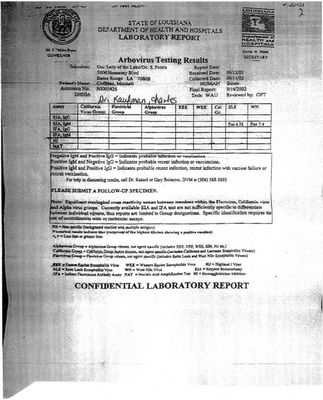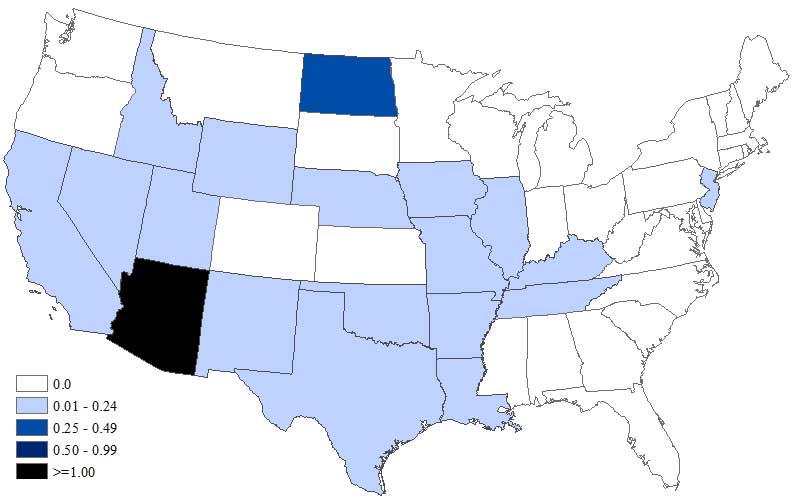Survivors Of West Nile
Virus Tell Of Pain
By Dan D'Ambrosio
The Associated Press
5-25-4
DELTA, Colo. (AP) -- Nearly a year after a red and swollen mosquito bite on her wrist signaled the onset of West Nile virus, Jean Lemon still suffers from crippling bouts of fever.
Her husband, Lowell, also caught the virus and must use oxygen sometimes because he has trouble breathing. He rarely sleeps at night because the virus intensified the pain he feels from arthritis.
"It's been a real slog," said Jean Lemon, a 68-year-old retired dietitian who lives with her 74-year-old husband in this western Colorado town. Even without a fever, she said, "we both had feelings of being so hot, we'd be sitting still, drenched in sweat."
The mosquito-borne virus, which has marched steadily westward since the first domestic case turned up in New York in 1999, is back for another season, carried afar by infected birds.
While the virus has killed more than 560 people in the United States over the past five years, it has left another trail of misery across the country - survivors like the Lemons paralyzed or in searing pain.
"The infection goes away, but if there's severe nerve damage only some of it - and sometimes none of it - is going to be reversible over time," said Dr. Frank Judson, 62, director of the Denver Public Health Department.
Researchers say nearly 80 percent of people infected with West Nile virus won't show any symptoms and most of the rest will have only mild flu-like problems.
About one in 150, however, will develop serious symptoms that include high fever, convulsions and paralysis. A very few will die from encephalitis or meningitis, both involving inflammations of the brain.
Like the Lemons, many victims recover with symptoms that don't go away. Others spend months in the hospital before returning home.
Frank Boggs, 73, collapsed last August and was taken to a hospital by his wife, Edith. He lay in a bed for months, paralyzed and on a respirator, before going home in a wheelchair. He said he can't remember three weeks of his life.
"I have a caretaker who comes in every morning and every night," Boggs said. "They exercise my arms and legs and have me standing. It's kind of exciting when I stand. I figure in another couple of months I'll be walking again."
Judson, the Denver health official, said doctors many times can do nothing but wait to see whether West Nile virus patients bounce back from neurological damage.
"If neurological function hasn't recovered by two or three months, then the prospects aren't good," he said. "The older you are, the more severe the disease. The longer the coma, the less likely there's hope for major restoration of function."
Others have succumbed after long, savage battles with a disease that no one has figured out how to fight.
Rick Derksen, 51, died in March after a seven-month struggle against the disease, the last of 61 victims the virus claimed in Colorado during the 2003 season.
His daughter, Angie Murray, 26, remembers admonishing her dad to use mosquito repellent. He was outside a lot in the summer, umpiring softball games for the city of Longmont. "We were always yelling at him to spray himself," Murray said. "He would say, 'I'm wearing pants and a long-sleeve shirt.'"
Murray thinks that is why Derksen was reluctant to answer when doctors asked him if he had been bitten by a mosquito after he ended up in the hospital last August, sick and throwing up. He later owned up.
Soon Derksen was paralyzed from the neck down, unable to speak because he had to be on a respirator.
"We had to learn how to lip read," Murray said. "At the beginning it was hard. He would get real frustrated."
Complicating matters, Derksen was on medication to suppress his immune system because of a liver transplant a decade earlier. Doctors stopped that medication to help boost his immune system to fight off the complications of West Nile virus. He soon became susceptible to infections in the hospital.
Derksen later suffered brain damage, something his family has blamed on the hospital. On March 24, Murray and other relatives made the decision to halt his life support.
"They unhooked him and he kind of opened his eyes," Murray said. "He fought so long to stay with us. It only took 10 minutes. The doctor said his body was ready to go."
Copyright 2004 The Associated Press. All rights reserved. This material may not be published, broadcast, rewritten or redistributed.
http://www.mlive.com/newsflash/lateststories/
index.ssf?/base/national-24/1085379843283191.xml
Disclaimer
Email This Article
MainPage
http://www.rense.com













